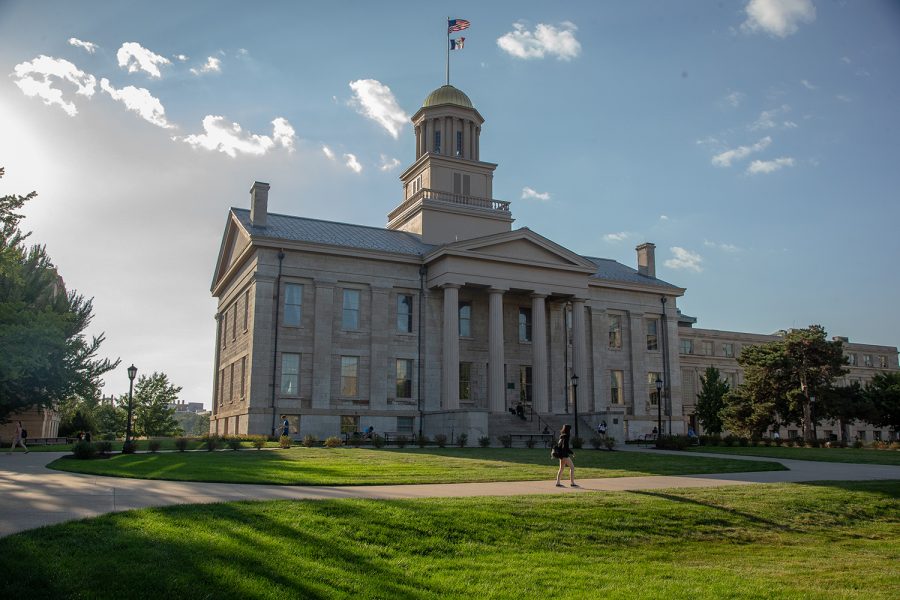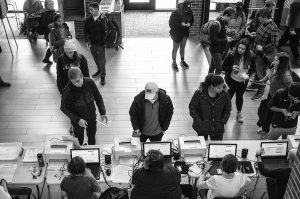Guest Opinion: UI must meet its sustainability goals
The Old Capitol building is seen in 2018.
March 13, 2019
This group of faculty, researchers, leaders, staff, graduate, and undergraduate students are committed to the long-term sustainability of energy and water in Iowa. We see the proposed public/private partnership of the University of Iowa’s power and water systems as a chance to discuss the big-picture, long-term vision for sustainability in the state. The 50-year term of the agreement presents an opportunity to advance our sustainability goals and pursue integrated infrastructural planning by the UI, Iowa City, and the region and all stakeholders should be involved in this discussion.
Faculty, staff, students, and community members share a deep commitment to ensuring that the university meets its carbon-footprint goals. Continued progress in this effort will maintain the UI’s reputation as a place that prioritizes sustainable development and pathbreaking research. Without the involvement of all stakeholders in this initiative, we risk abandoning or curtailing initiatives in research, teaching, and community engagement in favor of short-term financial objectives. We ask that administrators invite all interested members of the university community to the discussion, drafting, and editing sessions that will decide the future of facilities management at the UI.
As a top research and training institution that serves the state of Iowa, it is critical that we retain the ability to respond and adapt to an evolving technological and policy landscape. We are concerned that an agreement without appropriate benchmarks and mechanisms for ensuring our ability to respond to grand-challenges of five, 10, or even 20 years in the future would be a missed opportunity.
This concerned group believes that a public/private partnership will only be successful and forward-thinking if it includes the following base-line terms:
- First and foremost, a firm and unwavering commitment to sustainability, including the sustainability of campus, the corridor, and the state of Iowa;
- This firm and unwavering sustainability commitment must align with, and integrate, student training and research; and
- This commitment must remain flexible to energy transitions — technology and policy driven — that cannot be reliably predicted in the future.
To date, the UI has become a “best practices” institution in energy management in higher education by implementing a budget model that has driven key investments in energy infrastructure. Our ability to remain a leading institution for innovation and knowledge creation is inextricably linked to our physical campus facilities and how our faculty and staff interact with them. Having a forward-thinking conversation about the university’s various formal and informal collaborations with the Facilities Management team is vital in any future discussion. Our utilities and infrastructure experts have greatly added to the teaching and scholarship in several areas that are important to the core mission and research priorities of the university, and they must be involved in future conversations.
Other historic initiatives have expanded university partnerships. The city of Iowa City recently approved an Iowa City Climate Action and Adaptation Plan that establishes progressive community-wide greenhouse-gas emissions targets, the success of which depends upon a coal-free university utility. Given the importance of the utility to regional planning, our energy and water future discussion should include members of the city of Iowa City and Johnson County, as these stakeholders have a profound interest in the fate of the utility and the success of the Climate Action and Adaptation Plan.
It will be critical in any new energy and water investment that the university be able to respond to paradigm shifts in the energy sector that can lead to significant decarbonization in our power generation. We must have the flexibility of future markets maintained at the UI so that we meet our sustainability commitments without sacrificing flexibility. We must make it our priority to maximize the proportion of energy produced using renewable energy and minimize the use of fossil fuels. Therefore, we ask that administrators invite all interested and integral members of the university community to this discussion over the future of the UI.
Signed,
Blake Rupe
Manager, Office of Sustainability and the Environment
Dr. Tyler Priest
Associate Professor, History and Geography
Stratis Giannakouros
Director, Office of Sustainability and the Environment
David Cwiertny
Professor, Civil and Environmental Engineering
Michelle Scherer
Professor, Civil and Environmental Engineering
Dr. Jerry Schnoor
Co-Director, Center for Global and Regional Environmental Research
Barbara Eckstein
Professor, English, Co-Chair, Sustainability Charter Committee
Craig Just
Associate Professor, Civil and Environmental Engineering
Shaun Vecera
Professor, Psychological and Brain Sciences
Phillip J. Kerr
College of Engineering
Christian Bako
Graduate Student, Civil and Environmental Engineering
Amina Grant
Graduate Student, Civil and Environmental Engineering
Danielle Hollingshead
Graduate Student, Civil and Environmental Engineering
Madeline G. Jensen
Graduate Student, Civil and Environmental Engineering
Erica Wiener
Graduate Student, Civil and Environmental Engineering
Megan Lindmark
Graduate Student, Civil and Environmental Engineering
Eden DeWald
Undergraduate Student, Geographical and Sustainability Sciences






